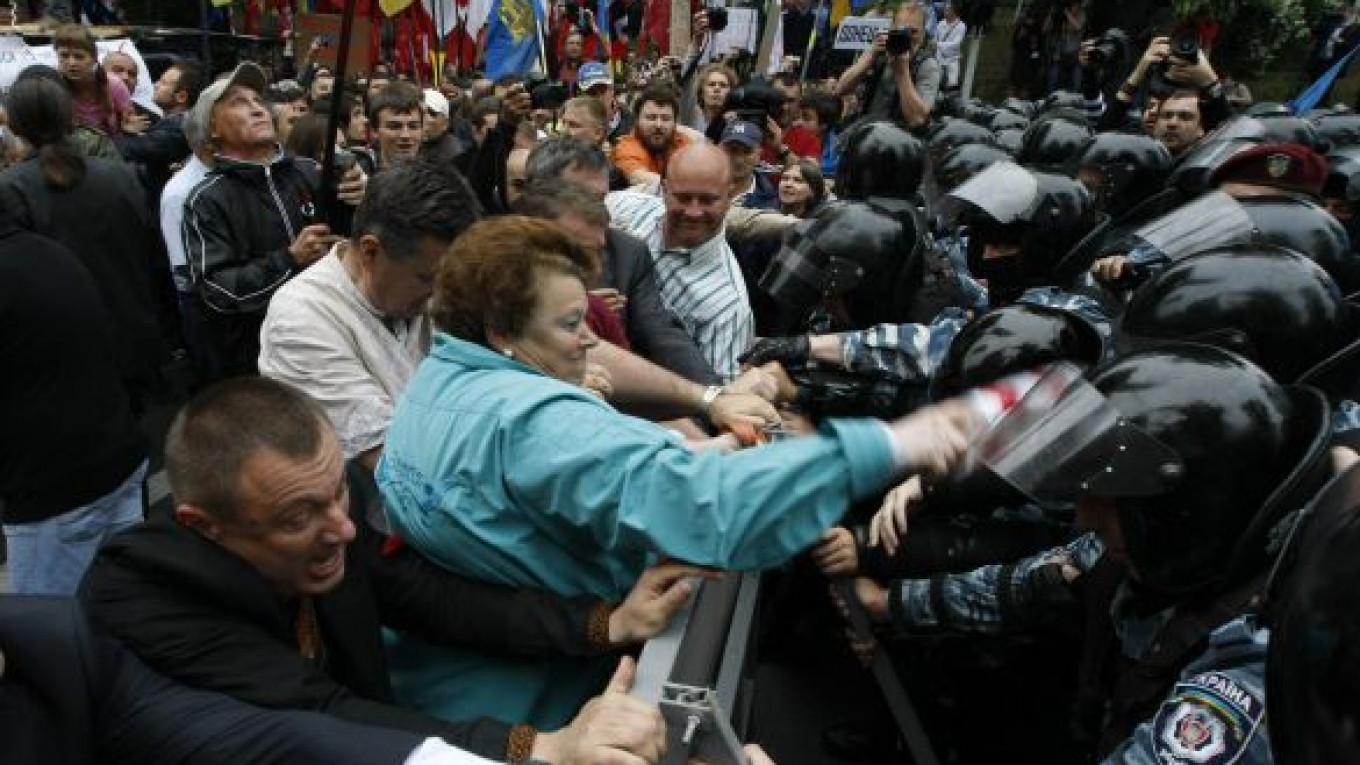KIEV — Defying vehement opposition, Ukraine’s pro-government lawmakers on Tuesday gave tentative approval to a bill that would allow the use of Russian in official settings alongside Ukrainian in some regions of the country.
Several thousand flag-waving activists demonstrated outside parliament and loudly protested the bill, which would keep Ukrainian as the country’s only official language but allow Russian to be used in courts, hospitals and other institutions in Russian-speaking regions.
The crowd trampled official billboards for the Euro 2012 soccer tournament which Ukraine is jointly hosting with Poland. The matches begin Friday and have focused the attention of all of Europe to Ukraine.
The previous discussion of the bill late last month triggered a fight between lawmakers that left one parliament member hospitalized.
Tensions are high ahead of the October parliamentary election, in which the opposition has vowed to break President Viktor Yanukovych’s tight grip on power.
Yanukovych loyalists, who draw their support from the Russian-speaking east and south of Ukraine, passed the bill in the first of two votes Tuesday morning, saying it would give millions of Russian speakers in Ukraine the right to use the language of their choice.
It was unclear when the final discussion of the bill would take place.
“This bill fully corresponds to Ukraine’s European aspirations and European obligations,” said Vadym Kolesnichenko, who co-wrote the bill.
But members of the pro-Western opposition say the bill will make Russian the de facto second official language and stem the development of Ukrainian by creating no incentive for millions of Ukrainians to learn and use it.
They also say it will pull Ukraine back into the Russian sphere of influence and hamper efforts to build closer political and economic ties with the European Union.
Opposition members said they would continue their protests during Euro 2012 and vowed that the bill would never become law.
“The law on a second state language in Ukraine will not exist,” said opposition leader Arseniy Yatsenyuk. “We lost the battle, but we will win the war.”
Ukraine is riven by historical and cultural divisions, with the Ukrainian-speaking west of the country yearning to shake off Russian influence and be part of Europe, and the Russian-speaking east and south largely wanting to maintain Ukraine’s long-standing ties to Moscow.
A Message from The Moscow Times:
Dear readers,
We are facing unprecedented challenges. Russia's Prosecutor General's Office has designated The Moscow Times as an "undesirable" organization, criminalizing our work and putting our staff at risk of prosecution. This follows our earlier unjust labeling as a "foreign agent."
These actions are direct attempts to silence independent journalism in Russia. The authorities claim our work "discredits the decisions of the Russian leadership." We see things differently: we strive to provide accurate, unbiased reporting on Russia.
We, the journalists of The Moscow Times, refuse to be silenced. But to continue our work, we need your help.
Your support, no matter how small, makes a world of difference. If you can, please support us monthly starting from just $2. It's quick to set up, and every contribution makes a significant impact.
By supporting The Moscow Times, you're defending open, independent journalism in the face of repression. Thank you for standing with us.
Remind me later.






